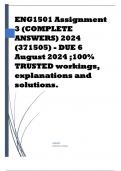ENG1501 Assignment
3 (COMPLETE
ANSWERS) 2024
(371505) - DUE 6
August 2024 ;100%
TRUSTED workings,
explanations and
solutions.
ADMIN
[COMPANY NAME]
, Section A: Reflective essay: Novel (Unit 4) In 300 – 400 words reflect on Unit
4 of your study guide and how it relates to your prior knowledge and
experience, as well as how it has informed your appreciation of novels. Write
your reflections in paragraph form guided by the questions below. 1. Have you
read any novels? If so, what types of novels have you read? (When we refer
to a type, we really mean a “genre”. A genre refers to the categories into
which novels can be classified, such as crime novels, romance novels,
science fiction or fantasy novels. Share the title and author of a South African
novel you have read (if you have read one). Does it have any similarities with
Small Things? Mention a few.
Reflecting on Unit 4 of my study guide, I find myself drawn to the intersection of my
prior knowledge and experience with the newfound insights garnered from exploring
novels. Yes, I have delved into novels across various genres over the years, broadening
my literary palate. Crime novels like Agatha Christie's "Murder on the Orient Express"
and classic literature such as Jane Austen's "Pride and Prejudice" have captivated my
imagination. Additionally, science fiction works like Isaac Asimov's "Foundation" series
have transported me to distant galaxies, while fantasy epics like J.R.R. Tolkien's "The
Lord of the Rings" have enthralled me with their rich world-building.
Regarding South African literature, I had the pleasure of reading "Disgrace" by J.M.
Coetzee, a poignant exploration of identity, power, and redemption set in post-
apartheid South Africa. Drawing parallels between "Disgrace" and "Small Things" by
Nthikeng Mohlele, similarities emerge in their introspective narratives that delve into the
complexities of human nature and societal dynamics. Both novels navigate themes of
memory, loss, and the search for meaning in a changing world, offering profound
insights into the human condition.
In "Small Things," Mohlele masterfully weaves a tapestry of memories and reflections
through the protagonist's introspective journey, mirroring Coetzee's exploration of
personal and collective reckonings in "Disgrace." The introspective nature of both novels
invites readers to confront uncomfortable truths about themselves and society,
challenging preconceived notions and prompting introspection.




